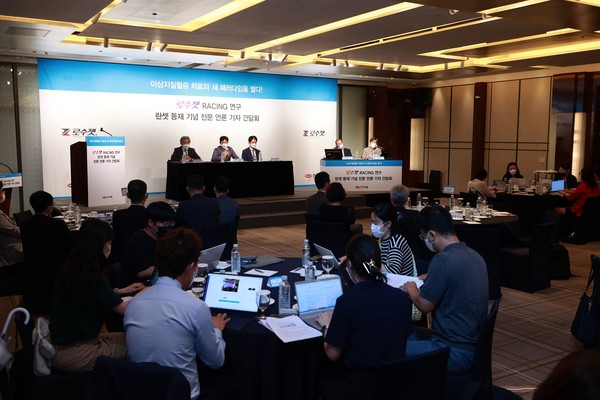Hanmi Pharmaceutical said it was ready to lead the local dyslipidemia treatment market with Rosuzet (rosuvastatin 10mg+ezetimibe 10mg) because of the treatment’s “distinguished evidence for therapeutic benefits.”
At a news conference in Seoul Monday, Hanmi disclosed the results of the RACING trial, saying moderate-intensity statin (rosuvastatin) plus ezetimibe was more beneficial than high-intensity statin alone. The study results were published in the Lancet in July.

The RACING study is a large-scale, investigator-initiated study that enrolled 3,780 patients with atherosclerotic cardiovascular disease (ASCVD) and tested the treatment for five years.
The researchers recruited ASCVD patients from February 2017 to December 2018 at 26 Korean hospitals, including Severance Hospital, Cha University, and Korea University Anam Hospital. They randomly assigned Rosuzet (rosuvastatin 10mg+ezetimibe 10mg) combination to 1,894 patients and high-intensity statin (rosuvastatin 20mg) monotherapy to 1,886 patients. Then, the researchers had a three-year follow-up.
According to the results, cardiovascular death, major cardiovascular event, or nonfatal stroke three years after the administration – the primary endpoint -- occurred in 9.1 percent of the combination group vs. 9.9 percent in the monotherapy group. The combination therapy demonstrated non-inferiority to the monotherapy, the research team said.
Seventy-three percent of the combo group reached the secondary endpoint, set as LDL cholesterol lower than 70mg/dL, at one year, vs. 55 percent of the monotherapy arm. In addition, the rosuvastatin plus ezetimibe group showed a significantly higher percentage in lowering LDL cholesterol.
At 2 and 3 years, an LDL cholesterol lower than 70 mg/dL was observed in 75 percent and 72 percent of patients in the combination therapy group, respectively, compared with 60 percent and 58 percent of patients in the monotherapy group.
The proportion of patients who discontinued treatment or reduced dose due to statin intolerance was 4.8 percent in the combo group and 8.2 percent in the monotherapy group.

Professor Kim Byeong-keuk of cardiology at Severance Hospital, who led the study, said, “To date, there have been no long-term follow-up studies that compared a reduced-dose statin/ezetimibe combination therapy with a conventional high-dose statin monotherapy for longer than one year.”
He emphasized that the latest large-scale, investigator-initiated study provided evidence that statin plus ezetimibe combination, like Rosuzet, could be more beneficial than high-dose statin monotherapy.
Kim said the study suggested a new alternative to the standard treatment to prevent secondary complications of ASCVD patients, such as myocardial infarction or stroke recurrence.
As moderate-intensity statin plus ezetimibe was more beneficial in lowering LDL cholesterol and reducing side effects, he added that Rosuzet suggested a new treatment paradigm for dyslipidemia treatment.
In Korea, not only rosuvastatin plus ezetimibe combo but atorvastatin or pitavastatin plus ezetimibe drugs are available. Therefore, some may interpret the RACING results as the effect of moderate-intensity statin plus ezetimibe drug class.
However, Kim said Rosuzet's results should be distinguished from the “drug class effect,” saying evidence-based medicine was important.
As there are numerous kinds of statins on the market, he noted each statin with different doses has different LDL-C lowering effects.
“So, it’s difficult to say that rosuvastatin plus ezetimibe effect could be similar to that of a statin combo drug,” he said.

